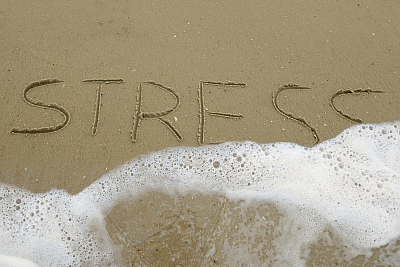Your AC breaks on a sweltering day. Someone cuts you off on the interstate. Your boss or teacher hands you an assignment with a crazy deadline.
We’ve all been there! And it’s all too easy to let these situations get the better of us. As it turns out, there are better and worse ways of handling such moments.
We spoke with Dr. Glenn Levine, an expert with the American Heart Association, to learn why the way we manage high pressure situations is important, both for helping us cope in the moment and for preventing chronic stress. Read on to get practical tips for tackling high-pressure situations from Dr. Levine, and from other trusted sources at the American Heart Association, Psychology Today, and others.
When Stress Boils Over

Dr. Glenn Levine
Stress is a normal reaction to high-pressure situations, one that happens both physically and mentally. “Your body releases a lot of adrenaline, your blood pressure goes up, and your heart rate goes up. Your brain’s response soon follows,” Dr. Levine explains. “This is in essence the fight-or-flight response, our natural way of detecting danger.”
Sometimes stress motivates us to perform—hence the phrase “works well under pressure”—and sometimes it overwhelms us. If the latter feeling is left unchecked, it can lead to feeling a lack of control. This cycle only adds more fuel to the fire, Dr. Levine tells us.
Chronic stress can have lasting effects, contributing to high blood pressure (hypertension), asthma, digestive issues, mental health conditions such as depression and anxiety, and more. Even more compelling: Newer research shows a mind-heart-body connection. Mental health conditions can be risk factors for poorer heart health and increase the risks of further heart problems down the line if you already have heart disease.
But there is good news here, too. “The flip side is that people who have positive psychological health attributes, such as gratitude and positive outlook on life seem to do better overall,” reports Dr. Levine.
10 Ways to Take the Pressure Off
 Blood boiling? Mind racing? Try these tips to keep high-pressure situations from escalating.
Blood boiling? Mind racing? Try these tips to keep high-pressure situations from escalating.
- Notice stress in its early stages. As you encounter a stressful situation, you may sense your muscles tensing, your heart pounding, and your palms sweating. Becoming aware of this physical response is key to coping with stress. “It’s easier to deal with stress when it is starting to build, instead of when you become overwhelmed,” says Dr. Levine.
- Think first, act second. When the pressure’s on, don’t act on instinct. Instead, take a step back and analyze the situation. If you are in conflict with someone else and need a moment to regroup, tell them so. You—and your relationship with them—will be better off.
- Identify what you can (and can’t) control. The weather, the news cycle, other people’s actions … these are things you can’t control in life. So why waste your time on them? Instead, experts recommend channeling your energy toward what you CAN control. These include your own behaviors, how you plan ahead, and the people you spend time with.
- Find a distraction. In a stressful situation, Dr. Levine recommends focusing your mind on something besides the anger, resentment, or frustration you are feeling. Turn on your favorite song or cuddle up with your pet. “It’s the adult version of telling a kid to count to ten. It gives your brain a chance to stop and think for a minute, and hopefully break the cycle of stress,” he says. (But beware of endless distractions, a.k.a. procrastination, which will only compound your stress.)
- Breathe! While you’re at it, take a few slow, deep breaths. Deep breathing is one of the most effective ways to lower stress in your body, and you can do it anytime, anywhere. It will instantly relax you and help bring down your heart rate too.
- Stay positive. Remember, your mind will almost always give up first, and you are physically capable of more than you think. Instead of dwelling on negative thoughts, try to find humor in the circumstances (of course your laptop crashed the night before your big project was due!). It may also help to reframe challenges as opportunities to grow or advance. For instance, that aggressive deadline can be a chance to learn a new skill or befriend a new coworker.

- Calm your voice. No matter how you feel on the inside, try projecting calmness with your voice. If you can avoid sounding stressed or panicked, it will relax both you and others around you. Often, your outlook will follow suit. (Faking a smile can have the same effect!)
- Understand you have a choice. Some experts point out that an event or another person itself doesn’t cause stress—instead, it’s our reaction to that event or person. As Dr. Levine puts it (paraphrasing others): “The event is just an event. What that person said to you is just what they said. We can allow the situation to cause us stress, or we can choose not to.” That knowledge alone can be empowering.
- Try meditation. Practicing meditation can teach you to better monitor your mind and observe what is happening around you. Says Dr. Levine, “With meditation, you learn when your mind is doing things that are detrimental”—and how to break the cycle.
- Talk it out. Mental health is just as important as physical health and learning to deal with stress in a healthy way takes practice. Many of us need to work on it for life! Try talking with a family member or friend who can help reset your perspective. But if you find stressful situations to be a daily problem, Dr. Levine says an effective stress-reduction class or working with a mental health professional can help.
 Releasing Steam
Releasing Steam
From work to school to personal relationships, high-pressure situations are part of life. There will always be bills to pay, loved ones who need your attention, and deadlines to meet.
“We all have to accept that life has its challenges, and that you can’t fight every one of them,” encourages Dr. Levine. “Acceptance puts you in a much better frame of mind to rationally deal with stress.” In other words, pick your battles!
So, the next time life throws you a curveball, turn to these tips—and take some of the pressure off.
Note: Since everyone’s health history and nutritional needs are so different, please make sure that you talk with your doctor and a registered dietitian to get advice about the diet and exercise plan that‘s right for you.

